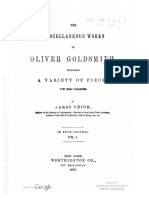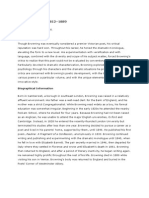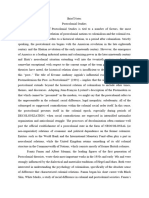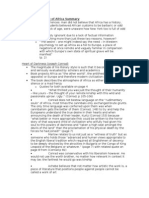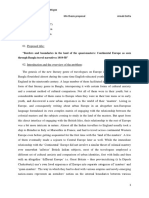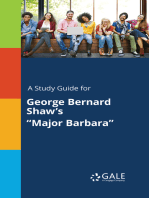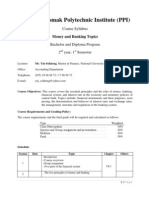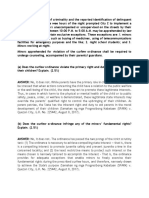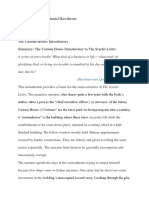Rudyard Kipling & Joseph Conrad's Colonialism.
Rudyard Kipling & Joseph Conrad's Colonialism.
Uploaded by
Jamil Hossain SujonCopyright:
Available Formats
Rudyard Kipling & Joseph Conrad's Colonialism.
Rudyard Kipling & Joseph Conrad's Colonialism.
Uploaded by
Jamil Hossain SujonOriginal Description:
Copyright
Available Formats
Share this document
Did you find this document useful?
Is this content inappropriate?
Copyright:
Available Formats
Rudyard Kipling & Joseph Conrad's Colonialism.
Rudyard Kipling & Joseph Conrad's Colonialism.
Uploaded by
Jamil Hossain SujonCopyright:
Available Formats
Rudyard Kipling, Joseph Conrad and Colonialism
Joseph Conrad's Heart of Darkness and Rudyard Kipling's Kim are in essence descriptions of what happens when Europeans attempt to force their cultural values on other countries. oth have something important and valid to say. !hey place their characters as the speakers" #ut the authors' voiced are also heard in these pieces. Rudyard Kipling's #ook is much milder and less cautionary than Joseph Conrad's Heart of Darkness. Kipling's Kim is a character that takes on many characteristics of #oth sides" the ritish and the $ndian. !he reader sees the result of what happens when cultures can #lend. !herefore" the reader understands the downside of colonialism #ut also the fact that Kipling views this colonialism as %right.% &n the other hand" Kurt' in Heart of Darkness a#solutely shows the reader the horrors and evils that colonialism inflicts on the coloni'ed. However" #oth of these authors have something important to say a#out colonialism. Rudyard Kipling's novel Kim presents two sides of colonialism in the ritish rule of $ndia" #ut the ritish side is presumed right as much as Kipling did not want to #e la#eled racist. $n this novel" the white man has the #urden of ruling the dark and therefore inferior races. Kipling wrote this novel at a time when ritish rule was" in fact" #eing (uestioned. )s *istry says in a criti(ue" %!hese characters ena#le Kipling to e+plore the way colonialism defined its own social #oundaries and Kipling uses this to show how native mentality and ritish supremacy often came into confrontation. ,*istry-. !hese two forces are in conflict as Kipling writes the #ook. Kim is a little of #oth" ritish and $ndian. Kim is a white #oy who has grown up with $ndian ways. )t the #eginning of the #ook he sees himself as almost e+clusively $ndian and yet the reader sees him sitting on a cannon in a game of %king of the castle% $n this game he stops other #oys ,*uslim and Hindu- from ousting him from his position of superiority. He has already taken on the superior attitude of the ritish in many ways. He also sees himself as the rightful owner of the lama. %!he lama was his trove" and he proposed to take possession% ,Kipling ./-. !he idea of one country taking possession over another is shown in this simple children's game. )nother possi#le danger of colonialism is lack of identity. Kim (uestions his own identity in %&h" *ah#u# )li" #ut am $ a Hindu0 ,Kipling .1- or from Chapter 23 %$ am Kim. $ am Kim. )nd what is Kim0 His soul repeated it again and again% ,442-. He feels that he should identify with one group or the other. $s he ritish or is he $ndian0 Kim is Kipling's attempt at trying to warn the world of the power of the $ndian people" and the fact that they do want to reclaim their country. Kim em#odies the #elief that it was %right% fro the ritish to rule in $ndia. !his is not (uestioned in Kipling's mind. )s seen in Chapter three when the soldier makes a coment on the 5reat *utiny of 2631" his claim is dismissed as %madness.% %) madness ate into all the army" and they turned against their officers ,Kipling 2//- !his is Kipling's own feeling inter7ected here as is %the Curator smiled at the mi+ture of
old8world piety and modern progress that is the note of $ndia today ,39-. !his is not to say that Kipling does not have great love for $ndia #ased on personal e+perience" it is 7ust that like many of his contemporaries" he never (uestioned the rightness of the ritish rule of $ndia. Kipling does present the ritish for criticism as well. :or e+ample in Chapter 3 when Kim finds %;ine hundred first8class devil" whose 5od was a Red ull on a green field"% Kim is captured #y the soldiers. Kipling uses this scene to show the $ndian viewpoint as opposed to the ritish. Kipling ridicules Christian ministers as %ministers of the creed that lumps nine8 tenths of the world under the title of heathen ,Kipling 24.-. Reverend ennett shows the worst kind of leader of the white man's #urden when he says %<ou will #e what you're told to #e"% said ennett= %and you should #e grateful that we're going to help you% ,Kipling 2>2-. He does show ignorance and racism in these coloni'ers. %!he distinction Kipling is actually making is #etween those Europeans" such as Creighton" and Kim himself" who have #een in $ndia a long time and know the country well" and those 'uncurried donkeys' ,Ch.3 p.24.- who have recently arrived" knowing nothing a#out the country" #ringing with them all that was worst in the ritish mentality. ,?aid!here are also parts of the novel that seem to #e a mi+ of #oth the ritish and the $ndian. $n the chapter called !he !wo8?ided *an" Kim is a#le to use his skills from #oth worlds. @hen Aurgan attempts to %#rainwash% him" he is a#le to resist this #y repeating mathematical ta#les he learned. ?o while Kim is attracted to the unregimented $ndian ways" he is a#le to use the regimentation of the ritish to outsmart Aurgan. !his might #e descri#ed as the hy#rid that ritish $ndia would #ecome. ?o Kim changes in that he uses #oth sides of himself to create a #etter mi+ 7ust as colonialism itself would have to adapt. Joseph Conrad's Heart of Darkness is a much harsher condemnation of the terror and oppression that result from domination" particularly European domination of )frica. Conrad" like Kipling had personal knowledge of his su#7ect matter. He had #een to the Congo in the 269/s and presents the view through *arlow" who must see this horri#le truth that he is forced to witness in the Congo. %?hocked #y his e+periences in the 269/s" Conrad views colonialism as a moral vice and a cultural #ully of the Europeans" clearly elucidating the vices of western culture in )frica% ,!eisch-. Conrad tells the reader over and over again that imposing the structure of western culture on )frica is useless much as the railway truck that is sitting on its #ack and is descri#ed as an animal carcass. Kurt' #ecomes totally corrupted #y the power that he has" as is representative of the people who coloni'e. %Kurt' serves as the em#odiment of man's potential for evil" a sym#ol of the
European colonist in Conrad's eyes% ,!eisch-. !he reader is left with the futility of forcing our #eliefs on other cultures. *arlow shows us that anyone can #e drawn into the we# of colonialism. Kurt' has #een completely drawn into the lust for power and greed and has turned into a monster. *arlowe can at least understand Kurt' a little" which is what makes his character so distur#ing. !his (uote shows show easy it might #e to #e drawn into this we#. %...$n some inland post feel the savagery" the utter savagery" had closed round him88all that mysterious life of the wilderness that stirs in the forest" in the 7ungles" in the hearts of wild men. !here's no initiation either into such mysteries. He has to live in the midst of the incomprehensi#le" which is detesta#le. )nd it has a fascination" too" which goes to work upon him. !he fascination of the a#omination88you know. $magine the growing regrets" the longing to escape" the powerless disgust" the surrender" the hate.% Bart 2" pg. > in the end" the greed for profit takes over. !he need for ivory #ecame more important to Kurt' than the mission to civili'e the natives88he #egan using violence and power to get more ivory and hence more money. )nd in fact" he civili'es them not at all. !he view of colonialism itself is seen in this (uoteC %!he old river in its #road reach rested unruffled at the decline of day" after ages of good service done to the race that peopled its #anks" spread out in the tran(uil dignity of a waterway leading to the uttermost ends of the earth... Hunters for gold or pursuers of fame" they all had gone out on that stream" #earing the sword" and often the torch" messengers of the might within the land" #earers of a spark from the sacred fire. @hat greatness had not floated on the e## of that river into the mystery of an unknown earthD...!he dreams of men" the seed of commonwealth" the germs of empires% ,Conrad E-. !his is the reader's opening view of colonialism as seen through the eyes of Conrad. !his old river and these people are e+ploited #y %hunters of gold% or %pursuers of fame.% !his is what colonialism will eventually lead to. *arlow discusses some of the dangers in this (uoteC %!he con(uest of the earth" which mostly means the taking it away from those who have a different comple+ion or slightly flatter noses than ourselves" is not a pretty thing when you look into it too much% ,Conrad >-. !hat really sums up Conrad's view of colonialism as a taking away from a society" as an e+ploitation. !he rulers dislike the native people and have no pro#lem e+ploiting or even killing them. %!he danger of colonialism is seen againC %'@hen one has got to make correct entries" one comes to hate those savages88hate them to the death% ,Conrad 23-. $n colonialism" it is very easy to get caught up in the greed for power and profit" which is shown #y Kurt'. @hen *arlow asks another character why he has come to the Congo" the
greed is shown in his answer. %$ couldn't help asking him once what he meant #y coming here at all. '!o make money" of course. @hat do you think0' he said scornfully.% ,Conrad 2.-. and in one very #old statement without even trying to hide greed a little. 'He declared he would shoot me unless $ gave him the ivory and then cleared out of the country" #ecause he could do so" and had a fancy for it" and there was nothing on earth to prevent him killing whom he 7olly well pleased.% ,Conrad 3/-. !he reader can clearly see what can happen to people with no one to stop them. :or this reason alone" colonialism is very dangerous. !he dangers of corruption are seen here as wellC %Everything #elonged to him88#ut that was a trifle. !he thing to know was what he #elonged to" how many powers of darkness claimed him for their own. !hat was the reflection that made you creepy all over. $t was impossi#le88not good for one either88trying to imagine. He had taken a high seat amongst the devils of the land88$ mean literally. <ou can't understand88how could you0% ,Conrad >4-. the direct #oldness of this statement is unimagina#le and is e+actly what Conrad is cautioning the reader a#out. !he theme of darkness also plays a part throughout the novel along with the title itself. !hese things e+press Conrad's thoughts a#out colonialism as a %dark% venture. !he closer the reader gets to Kurt'" the farther into the native culture" the scarier it gets. !he reader knows that Kurt' has overe+tended his power and only #ecause he can. !here is no#ody there to stop him and the natives #oth revere and fear him. %!he reaches opened #efore us and closed #ehind" as if the forest had stepped leisurely across the water to #ar the way for our return. @e penetrated deeper and deeper into the heart of darkness.% ,Conrad 4/-. Fuote E.C !he reader is shown again the darkness of this colonialism and the darkness of the men involved in it. $t is good for no one" according to Conrad. %$ raised my head. !he offing was #arred #y a #lack #ank of clouds" and the tran(uil waterway leading to the uttermost ends of the earth flowed som#er under an overcast sky88seemed to lead into the heart of an immense darkness.% ,Conrad .9-. Bro#a#ly the scariest part of the #ook is the fact that people like *arlow can #e drawn into this power and greed. ;ot that *arlow agreed with Kurt' at all" #ut the reader understands how this travesty may have happened. *arlowe shows this when he says"% $ turned to the wilderness really" not to *r. Kurt'" who" $ was ready to admit" was as good as #uried. )nd for a moment it seemed to me as if $ also was #uried in a vast grave full of unspeaka#le secrets. $ felt an intolera#le weight oppressing my #reast" the smell of the damp earth" the unseen presence of victorious corruption" the darkness of an impenetra#le night% ,Conrad 33-.
You might also like
- Human Trafficking SpeechDocument4 pagesHuman Trafficking Speechapi-310560627100% (1)
- Positionpaper Mistry SwimmingLessons Kapralova 2012 PDFDocument8 pagesPositionpaper Mistry SwimmingLessons Kapralova 2012 PDFSushobhan MazumdarNo ratings yet
- Styles: Parody and BurlesqueDocument3 pagesStyles: Parody and BurlesqueSiva KumaravelNo ratings yet
- O4 Hope and Despair: A Fine BalanceDocument31 pagesO4 Hope and Despair: A Fine BalanceAaryan Nayak100% (2)
- Death of A Salesman As A Modern TragedyDocument5 pagesDeath of A Salesman As A Modern TragedyJamil Hossain Sujon100% (2)
- Hill and Jones Chapter 4 Strategy at Functional LevelDocument31 pagesHill and Jones Chapter 4 Strategy at Functional LevelRommel de VeraNo ratings yet
- Water Distribution System Hydraulic ModelingDocument8 pagesWater Distribution System Hydraulic ModelingMichaelNo ratings yet
- Kim, by Rudyard Kipling - . - A Master Work of Imperialism - . - A Rich and Absolutely Fascinating, But Nevertheless Profoundly Embarrassing NovelDocument9 pagesKim, by Rudyard Kipling - . - A Master Work of Imperialism - . - A Rich and Absolutely Fascinating, But Nevertheless Profoundly Embarrassing NovelPrasanta K PattadarNo ratings yet
- Said Introduction KimDocument22 pagesSaid Introduction KimPoulomi Saha100% (1)
- The Strange Affair of Robin NgangomDocument11 pagesThe Strange Affair of Robin NgangomManya Suri100% (1)
- Bullock yDocument10 pagesBullock ySuman PrasadNo ratings yet
- MA ENGLISH PreviousDocument25 pagesMA ENGLISH PreviousRadheShyam SharmaNo ratings yet
- Oliver Goldsmith On National PrejudicesDocument10 pagesOliver Goldsmith On National Prejudicesdjpost100% (3)
- 09 - Chapter 4 PDFDocument70 pages09 - Chapter 4 PDFujjwal kumarNo ratings yet
- Compartive Analysis of Things Fall Appart and Heart Od DarknessDocument3 pagesCompartive Analysis of Things Fall Appart and Heart Od DarknessIshika KalwaniNo ratings yet
- Robert Browning PoetryDocument4 pagesRobert Browning PoetrypelinNo ratings yet
- 2 6 17 357 PDFDocument3 pages2 6 17 357 PDFfrielisa frielisaNo ratings yet
- 6 - Heart of Darkness Character of Kurtz-RiseNotesDocument3 pages6 - Heart of Darkness Character of Kurtz-RiseNotessamskhangNo ratings yet
- Theme of Love and Mysticism in English and Pakistani Poetry With Reference To Wordsworth and Shinwari's PoetryDocument9 pagesTheme of Love and Mysticism in English and Pakistani Poetry With Reference To Wordsworth and Shinwari's PoetryUr FaaNo ratings yet
- 'Beautiful City of Tirzah' AnalysisDocument3 pages'Beautiful City of Tirzah' Analysisrandom throwawayNo ratings yet
- Passage To IndiaDocument12 pagesPassage To IndiaArnavBhattacharyaNo ratings yet
- Writing RefugeeDocument11 pagesWriting RefugeeClara Willemsens100% (1)
- Raymond Williams, The Writer-Commitment and AlignmentDocument4 pagesRaymond Williams, The Writer-Commitment and AlignmentnathanhNo ratings yet
- Brief Notes Postcolonial StudiesDocument8 pagesBrief Notes Postcolonial Studiesawtshfhd100% (1)
- Essays of Elia (Article)Document16 pagesEssays of Elia (Article)KifayatShaaNo ratings yet
- 08.31.2011 - An Image of Africa SummaryDocument2 pages08.31.2011 - An Image of Africa Summarygroundup_jaNo ratings yet
- WILLIAM K and Beardsley IntroDocument6 pagesWILLIAM K and Beardsley IntroShweta SoodNo ratings yet
- Stream of ConciousnessDocument4 pagesStream of ConciousnessaliNo ratings yet
- 10 - Chapter 3 PDFDocument37 pages10 - Chapter 3 PDFAbhay HariNo ratings yet
- 04 BWordsworth Prefaceto Lyrical Ballads SummaryDocument3 pages04 BWordsworth Prefaceto Lyrical Ballads Summarypatrck92No ratings yet
- Tragedy Without CharacterDocument9 pagesTragedy Without CharacterMerletoNo ratings yet
- Pakistani Literature (Poems) Alamgir's Contribution: Chair. Taufiq Rafat, Daud Kamal Were His ContemporariesDocument5 pagesPakistani Literature (Poems) Alamgir's Contribution: Chair. Taufiq Rafat, Daud Kamal Were His Contemporariesاسامہ ارشدNo ratings yet
- Heart of Darkness Seminar Discussion PointsDocument2 pagesHeart of Darkness Seminar Discussion Pointsapi-258322426No ratings yet
- 20th Century Novel - Notes-2-1Document33 pages20th Century Novel - Notes-2-1Simo MijmijNo ratings yet
- Translation As RecoveryDocument5 pagesTranslation As RecoveryAAryan NayakNo ratings yet
- Mr. Housman's: MessageDocument3 pagesMr. Housman's: MessageFalak ChaudharyNo ratings yet
- Evolution Theory African Dramatic LiteraDocument15 pagesEvolution Theory African Dramatic LiteraAkpevweOghene PeaceNo ratings yet
- Ulysses: Tennyson, Alfred Lord (1809 - 1892)Document6 pagesUlysses: Tennyson, Alfred Lord (1809 - 1892)محمد ناصر عليويNo ratings yet
- Xanadu (William)Document3 pagesXanadu (William)Devolina DasNo ratings yet
- Anthropomorphism FinalDocument6 pagesAnthropomorphism Finalapi-280376493No ratings yet
- Homi Bhabha The Other QuestionDocument8 pagesHomi Bhabha The Other QuestionjticjournalNo ratings yet
- Comparative Study - Tess of The D'Urbervilles and The Mayor of CasterbridgeDocument3 pagesComparative Study - Tess of The D'Urbervilles and The Mayor of Casterbridgenonameface58100% (1)
- Eng TuglaqDocument5 pagesEng TuglaqNagnath TotawadNo ratings yet
- What Is Literature?: R.J. Rees, R.A. Scott-James, Terry Vargas LlosaDocument21 pagesWhat Is Literature?: R.J. Rees, R.A. Scott-James, Terry Vargas LlosaQhusnul AmaliaNo ratings yet
- Literary Characteristics of Puritan AgeDocument16 pagesLiterary Characteristics of Puritan AgeMaria Rani100% (1)
- Irony As A Reflection of Disbelief in "Bliss", by Katherine Mansfield.Document1 pageIrony As A Reflection of Disbelief in "Bliss", by Katherine Mansfield.Mido RHNo ratings yet
- The Scope of Orientalism Reserch QuestionDocument2 pagesThe Scope of Orientalism Reserch QuestionBilal ArshadNo ratings yet
- Perspectives On Thematic Concerns in Girish Karnad's Yayati PDFDocument8 pagesPerspectives On Thematic Concerns in Girish Karnad's Yayati PDFDEEPALI SETHNo ratings yet
- Joy Baba FelunathDocument48 pagesJoy Baba Felunathabhranilghosh1No ratings yet
- Imperialism in HodDocument6 pagesImperialism in HodZoobia Abbas100% (1)
- MA Thesis Proposal - Arnab Dutta GoeGroDocument7 pagesMA Thesis Proposal - Arnab Dutta GoeGroArnab DuttaNo ratings yet
- Characteristics of Romantic Literature - Sarwar Sir PDFDocument2 pagesCharacteristics of Romantic Literature - Sarwar Sir PDFRifat Ara KhatunNo ratings yet
- Summary of Where Do We StandDocument6 pagesSummary of Where Do We StandArnav ShahNo ratings yet
- National University of Modern Languages Department of English (UGS)Document4 pagesNational University of Modern Languages Department of English (UGS)Gul RukhNo ratings yet
- Langland's Piers Plowman Greatly Influenced The Canterbury TalesDocument6 pagesLangland's Piers Plowman Greatly Influenced The Canterbury TalesMettilda ThomasNo ratings yet
- V S Naipaul An AnalysisDocument15 pagesV S Naipaul An AnalysisJepter Lorde0% (1)
- Jacobean EraDocument16 pagesJacobean EraZarrar ShaikhNo ratings yet
- Summary and Character Analysis of Heart of DarknessDocument11 pagesSummary and Character Analysis of Heart of DarknessLalaNo ratings yet
- SLM-4th Sem English - Spectrum-Lit & Contemporary Issues PDFDocument29 pagesSLM-4th Sem English - Spectrum-Lit & Contemporary Issues PDFshahana s100% (2)
- Chapters of Biographia LiterariaDocument7 pagesChapters of Biographia Literariashah nawazNo ratings yet
- International Journal on Multicultural Literature (IJML): Vol. 6, No. 2 (July 2016)From EverandInternational Journal on Multicultural Literature (IJML): Vol. 6, No. 2 (July 2016)No ratings yet
- The Metamorphosis of Raju in R K NarayanDocument2 pagesThe Metamorphosis of Raju in R K NarayanJamil Hossain SujonNo ratings yet
- The GuideDocument7 pagesThe GuideJamil Hossain SujonNo ratings yet
- Short Summary of The Guide (Final)Document2 pagesShort Summary of The Guide (Final)Jamil Hossain SujonNo ratings yet
- Self Reliance by EmersonDocument3 pagesSelf Reliance by EmersonJamil Hossain Sujon100% (1)
- The Guide by R K NarayanDocument2 pagesThe Guide by R K NarayanJamil Hossain Sujon100% (2)
- Colonialism in Heart of DarknessDocument2 pagesColonialism in Heart of DarknessJamil Hossain SujonNo ratings yet
- Marxist CriticismDocument2 pagesMarxist CriticismJamil Hossain Sujon100% (1)
- The Bluest EyeDocument2 pagesThe Bluest EyeJamil Hossain SujonNo ratings yet
- Colonialism in Heart of DarknessDocument2 pagesColonialism in Heart of DarknessJamil Hossain SujonNo ratings yet
- A House For MR BiswasDocument2 pagesA House For MR BiswasJamil Hossain Sujon100% (1)
- Essays On AreopagiticaDocument1 pageEssays On AreopagiticaJamil Hossain SujonNo ratings yet
- Areopagitica, 1643: Speech For The Liberty of Unlicensed Printing To The Parliament of EnglandDocument3 pagesAreopagitica, 1643: Speech For The Liberty of Unlicensed Printing To The Parliament of EnglandJamil Hossain SujonNo ratings yet
- Badminton Asia Team Championships 2020: ProspectusDocument16 pagesBadminton Asia Team Championships 2020: ProspectusInes SilvaeraNo ratings yet
- Match Fixing and Sports Betting in FootballDocument12 pagesMatch Fixing and Sports Betting in FootballFaizal SeptiantoNo ratings yet
- Lecture 5 Palliative CareDocument15 pagesLecture 5 Palliative Carephoto copyhemnNo ratings yet
- B InggrisDocument2 pagesB InggrisJona ThanNo ratings yet
- Management Principles Final Papers Fall 2020Document2 pagesManagement Principles Final Papers Fall 2020Jawad NadeemNo ratings yet
- Key Issues From The UpdateDocument2 pagesKey Issues From The UpdateCiprianNo ratings yet
- Final AssignmentDocument4 pagesFinal AssignmentAftab MajeedNo ratings yet
- Falling Leaves ReviewDocument7 pagesFalling Leaves Reviewmy3gr8kidoosNo ratings yet
- Global Atlas of Palliative CareDocument111 pagesGlobal Atlas of Palliative CareSunil Kumar AggarwalNo ratings yet
- Week 7 ICT Project For Website Traffic Statistics and Performance AnalysisDocument16 pagesWeek 7 ICT Project For Website Traffic Statistics and Performance AnalysisMarie Regalario100% (1)
- PAPER WARIOR Adventures of A Pro Se Litigant in Illinois' Corrupt Judicial SystemDocument47 pagesPAPER WARIOR Adventures of A Pro Se Litigant in Illinois' Corrupt Judicial SystembollivarNo ratings yet
- BCPC (Resolution)Document10 pagesBCPC (Resolution)Sunshowie PangantingNo ratings yet
- Brack Bank Interni Igtyuujjj1Document41 pagesBrack Bank Interni Igtyuujjj1Ariful Haque SajibNo ratings yet
- Vikings in Greenland-An OverviewDocument4 pagesVikings in Greenland-An Overviewerfan_fNo ratings yet
- Oulton Park International Track Map - Driver61Document1 pageOulton Park International Track Map - Driver61antoinecl2118No ratings yet
- Weighbridge & Scrap Steel Training SummaryDocument3 pagesWeighbridge & Scrap Steel Training SummaryBayu Pamungkas WarmanNo ratings yet
- S1 Commercia Liens A Most Potent Weapon PDFDocument82 pagesS1 Commercia Liens A Most Potent Weapon PDFHoscoFoodsNo ratings yet
- Year Ender (Concept Paper)Document3 pagesYear Ender (Concept Paper)Jerz PortNo ratings yet
- Money & Banking, SyllabusDocument3 pagesMoney & Banking, SyllabusYIN SOKHENGNo ratings yet
- POLI BAR QsDocument7 pagesPOLI BAR QsKaren Gail Hechanova JavierNo ratings yet
- Level L - Wonderful WinterDocument7 pagesLevel L - Wonderful WinterNatia TchotchuaNo ratings yet
- Financial Accounting Bba Ist SemDocument20 pagesFinancial Accounting Bba Ist SemPrakash MJSNo ratings yet
- FAR HandoutDocument34 pagesFAR HandoutIamchyNo ratings yet
- Daily News Paper 16-12-2023Document8 pagesDaily News Paper 16-12-2023Lasitha MuhandiramgeNo ratings yet
- Scarlet Letter by Natheniel Hawthrone SparknotesDocument246 pagesScarlet Letter by Natheniel Hawthrone SparknotesNAVDEEP KALSINo ratings yet
- CWG History1Document4 pagesCWG History1fruitnutsNo ratings yet












